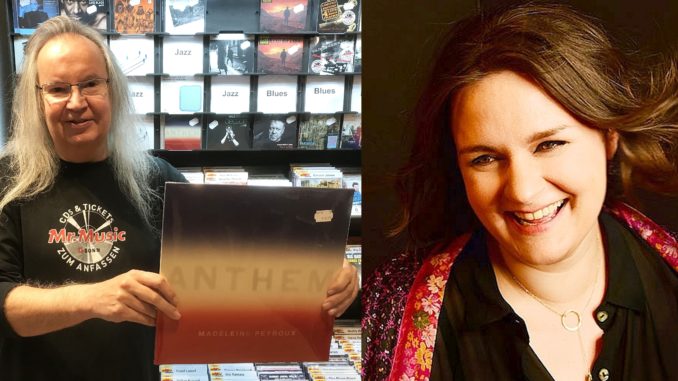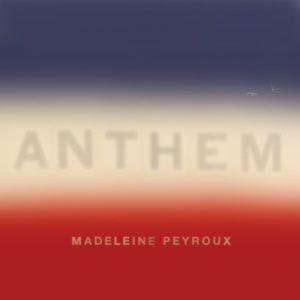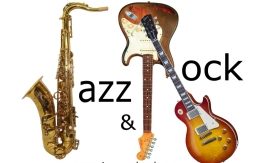
(English, please scroll down!)
Bernie Gelhausen führt – mit einer kleinen Unterbrechung – seit 25 Jahren das Platten- und CD-Geschäft „Mr. Music“ in der Bonner Innenstadt, eines der erfolgreichsten in der Republik. Ab sofort empfiehlt „Mr. Music“ auf JazzandRock Neuerscheinungen, heute Madeleine Peyroux „Anthem“, das es als CD und auf Vinyl gibt.
Mr. Music ist an der Münsterstraße 8, 53111 Bonn. Öffnungszeiten: Mo-Fr: 13:00 – 18:00 Uhr, Sa: 10:00 – 15:00 Uhr, Telefon: 0228-690901, E-Mail: info@mrmusic.com
Von Dylan Cem Akalin
 Madeleine Peyroux legt mit „Anthem“ ein Album vor, das nicht eindeutig einzuordnen. Das liegt letztlich wohl auch daran, dass „Anthem“ eigentlich eine Ensemble-Arbeit ist. Schon beim Opener „On My Own“ wird die Handschrift von Larry Klein deutlich. Der Bassist und Produzent hat schon mit allen möglichen Künstlern von Freddie Hubbard über Tracy Chapman bis Melody Gardot gearbeitet – und mit Joni Mitchell. Und das hört man diesem Album ungemein an. Es ist die sehr klare, stringente Produktion. Da wird nichts überlagert, da wirkt nichts überladen. Und Jonis Songwriting und späte Gesangskunst webt Madeleine Peyroux auch geschickt in ihren von Billie Holiday beeinflussten Stil ein. Herausgekommen ist ein bezauberndes Album, das Nostalgie („On A Sunday Afternoon“), etwas schrulligen Pop, wehmütige Poesie, leichtlebigen Jazz und nachdenkliches Singer/Songwriting zu einer kurzweiligen Songsammlung vereint, die man immer und immer wieder anhören will.
Madeleine Peyroux legt mit „Anthem“ ein Album vor, das nicht eindeutig einzuordnen. Das liegt letztlich wohl auch daran, dass „Anthem“ eigentlich eine Ensemble-Arbeit ist. Schon beim Opener „On My Own“ wird die Handschrift von Larry Klein deutlich. Der Bassist und Produzent hat schon mit allen möglichen Künstlern von Freddie Hubbard über Tracy Chapman bis Melody Gardot gearbeitet – und mit Joni Mitchell. Und das hört man diesem Album ungemein an. Es ist die sehr klare, stringente Produktion. Da wird nichts überlagert, da wirkt nichts überladen. Und Jonis Songwriting und späte Gesangskunst webt Madeleine Peyroux auch geschickt in ihren von Billie Holiday beeinflussten Stil ein. Herausgekommen ist ein bezauberndes Album, das Nostalgie („On A Sunday Afternoon“), etwas schrulligen Pop, wehmütige Poesie, leichtlebigen Jazz und nachdenkliches Singer/Songwriting zu einer kurzweiligen Songsammlung vereint, die man immer und immer wieder anhören will.
Mit zuversichtlicher Wehmut
Schlagzeuger Brian MacLeod, die Gitarristen Dean Parks und David Baerwald, Pianist Patrick Warren und Organist Pete Kuzma haben sicherlich auch gleichberechtigten Einfluss ausgeübt und sorgen für instrumentale Finesse, unterstützt von prominenten Gästen, darunter Luciana Souza und Grégoire Maret. Das gemeinsame Einfallsreichtum erstreckt sich auf alle Stücke – alles Originalmaterial bis auf den Titeltrack, eine Bearbeitung von Leonard Cohens „Anthem“ und die Vertonung des Gedichts von Paul Éluard „Liberte“.
Leonard Cohens „Anthem“
Die „Hymne“ hat Leonard Cohen aufgenommen, da war er 58 Jahre alt. Ein weiser 58-Jähriger. Der Song hat bei ihm so gar nichts hymnisches an sich, ein fast auf Sprechgesang reduziertes Lied, das von der Aussage zwischen Resignation und Kampfeswillen liegt, ein Mahnruf eines Mannes, der erschöpft im Morgengrauen zurückblickt und weiß, dass es Zeit ist, den Stab des Widerstands weiterzureichen, der weiß, dass noch lange nicht alles vorbei ist, dass es Hoffnung gibt. „There is a crack in everything (there is a crack in everything)/That’s how the light gets in.“ Immer noch aktuell der Song. Von ungemeiner Kraft. Das ist es wohl, warum Peyroux ihn als Titelsong gewählt hat. Und sie singt ihn mit so einer zuversichtlichen Wehmut. Larry Klein und sie hätten sich einmal über Politik unterhalten, erzählt sie. Im Verlauf des Gesprächs habe Klein ihr empfohlen, sich mal Cohens „Anthem“ anzuhören. Er habe sie sofort gefangen.
Es heißt, die Songs seien während der amerikanischen Wahlen entstanden. Scheinbar ahnte die Musikerin nichts Gutes. Denn die Songs sind voller Durchhalteparolen für Überlebenskünstler, für jene, die harte Zeiten durchmachen. Einer der stärksten Songs ist „All My Heroes“ mit einem ganz starken Text. Ihre Helden, singt sie, waren Menschen, die sich selbst als Verlierer sahen, Betrunkene, gefallene Heilige und Selbstmörder. Und sie singt ihn so anders. Mit Dean Parks‘ Slide-Guitar darunter klingt er wie ein Song von Joni Mitchell.
„All my heroes were rebels on the run
Plagiarizers, Vagabonds, Vagrants every one“
„Dieser Song liegt mir sehr am Herzen“, sagt Peyroux, die die verstorbenen Robin Williams, Leonard Cohen, George Carlin, Prince und David Bowie als einige ihrer Inspirationsquellen nennt. Aber ihre Bewunderung für diese Künstler habe nichts mit blinder Heldenverehrung zu tun. Ihre Helden waren Menschen, keine Götter. „Ich denke, die Hauptsache daran, dass man aus dem Genie eines anderen lernen kann, ist, dass man auch lernen muss, dass sie fehlerhaft sind“, sagt sie. „Das musst du akzeptieren, um die ganze Lektion zu bekommen, und darum geht es im Song.“
Helden mit Fehlern
Und so steht der Song in engem Zusammenhang zu „Anthem“, das auch seine eigenen Helden hat, aber sie sind fehlerhaft: eine bunte Sammlung von Entrechteten, Desillusionierten und Weltmüden; Verlierer, die nicht mehr glücklich sind und sogar um ihre geistige Gesundheit fürchten.
Freiheit – sowohl die persönliche als auch die politische – ist das Thema von „Liberté“, das Peyroux auf Französisch singt, eine schöne und bewegende musikalische Adaption von Paul Éluards berühmtem Gedicht, das er während der Nazi-Besetzung Frankreichs schrieb. Der Song war ursprünglich als Soundtrack zu einem französischen Dokumentarfilm namens „Sur La Pointe“ aufgenommen worden, ein Film über eine seltene tödliche Krankheit namens Duchenne-Muskeldystrophie.

Zu den weiteren Höhepunkten des Albums gehören „Party Tyme“, eine düster-humorvolle, aber einfühlsame Geschichte einer Person in der Reha; eine alkoholgetränkte Saloon-Ballade mit dem Titel „The Ghosts Of Tomorrow“, in der eine jazzige Trompete und eine gedankenvolle Mundharmonika hinter Peyroux‘ leidenschaftlichem Gesang einen rauchigen Dialog führen; und das lebensbejahende „We Might As Well Dance“, sowas wie eine zarte, balladeske Joni-Mitchell-Antwort auf Marvin Gayes „Sexual Healing“. Eine romantische Eskapade. Die Botschaft führt Cohens „Anthem“ weiter: „It’s easy to cry over all that is gone now/But I believe that we must carry on“. – „Es ist leicht über alles weinen, was vorbei ist/Aber ich glaube, wir müssen weitermachen“.
Englisch:
Bernie Gelhausen leads – with a short break – for 25 years the record and CD shop „Mr. Music“ in Bonn City, one of the most successful in the Republic. From now on he recommends new releases on jazzandrock.com. today Madeleine Peyroux „Anthem“, which is available on CD and on vinyl.
Mr. Music is at Münsterstraße 8, 53111 Bonn. Opening hours: Mon-Fri: 13:00 – 18:00, Sat: 10:00 – 15:00, Telephone: 0228-690901, E-Mail: info@mrmusic.com
By Dylan Cem Akalin
Madeleine Peyroux presents „Anthem“ an album that can not be clearly classified. This is probably due to the fact that „Anthem“ is actually an ensemble work. Already with the opener „On My Own“ the handwriting of Larry Klein becomes clear. The bassist and producer has worked with all sorts of artists from Freddie Hubbard to Tracy Chapman to Melody Gardot – and to Joni Mitchell. And you can hear it on this album immensely. It is the very clear, stringent production. Nothing is superimposed, nothing seems overloaded. And Joni’s songwriting and late vocal art is also cleverly woven by Madeleine Peyroux in her Billie-Holiday-influenced style. The result is an enchanting album that combines nostalgia („On A Sunday Afternoon“), slightly quirky pop, melancholy poetry, light jazz and thoughtful singer / songwriting into an entertaining collection of songs that you want to listen to over and over again. Great album!
Drummer Brian MacLeod, guitarists Dean Parks and David Baerwald, pianist Patrick Warren and organist Pete Kuzma certainly had equal influence on the album. They provide instrumental finesse, supported by celebrity guests, including Luciana Souza and Grégoire Maret. The shared ingenuity extends to all the pieces – all original material – with the exception of the title track, an adaptation of Leonard Cohen’s „Anthem“, and the setting of the poem by Paul Éluard „Liberte“.
„There’s a crack in everything“
„Anthem“ was recorded by Leonard Cohen when he was 58 years old. A wise 58-year-old. The song has nothing hymnish about it, a song almost reduced to chanting, which lies between the statement between resignation and the will to fight, a reminder from a man who looks back exhausted at dawn. He senses that it is time to pass on the staff of the resistance, he knows that not all is over yet, that there is hope. „There’s a crack in everything.“ That’s how the light gets in. „The song is still up to date. Of immense power. That’s why Peyroux chose it as the title song. And she sings it with such a confident melancholy. Larry Klein and she once talked about politics, she says. In the course of the conversation, Klein advised her to listen to Cohen’s „Anthem“. It caught her immediately.
It is said that the songs were created during the American election. Apparently, the musician did not suspect anything good. Because the songs are full of perseverance for survivors, for those who are going through hard times. One of the strongest songs is „All My Heroes“ with very strong lyrics. Heroes, she sings, were people who saw themselves as losers, „Drunkards, Fallen saints, and Suicides“. And she sings it so different. With Dean Parks‘ slide guitar below, it sounds like a song by Joni Mitchell.
„All my heroes were rebels on the run
Plagiarizers, Vagabonds, Vagrants every one“
Heroes were humans, not gods
„This song is very important to me,“ says Peyroux, who names the deceased Robin Williams, Leonard Cohen, George Carlin, Prince and David Bowie as some of their sources of inspiration. But her admiration for these artists has nothing to do with blind hero worship. Heroes were humans, not gods. „I think the main thing about being able to learn from someone else’s genius is that you also have to learn they’re flawed,“ she says. „You have to accept that to get the whole lesson, and that’s what the song is about.“
And so the song is closely related to „Anthem,“ which also has its own heroes, but they are flawed: a colorful collection of disenfranchised, disillusioned, and world-weary; Losers who are no longer happy and even fear for their sanity.
Freedom – both personal and political – is the theme of „Liberté“, which Peyroux sings in French, a beautiful and moving musical adaptation of Paul Éluard’s famous poem he wrote during the Nazi occupation of France. The song was originally recorded as a soundtrack to a French documentary called Sur La Pointe, a film about a rare deadly disease called Duchenne Muscular Dystrophy.
Other highlights of the album include „Party Tyme“, a somber-humorous but sensitive story of a person in rehab; an alcoholic saloon ballad titled „The Ghosts Of Tomorrow,“ in which a jazzy trumpet and a thoughtful harmonica lead a smoky dialogue behind Peyroux’s passionate singing; and the life-affirming „We Might As Well Dance,“ something like a tender, ballad Joni-Mitchell response to Marvin Gaye’s „Sexual Healing.“ A romantic escapade. The message continues Cohen’s „Anthem“: „It’s easy to cry over all that is gone now/But I believe that we must carry on“.
